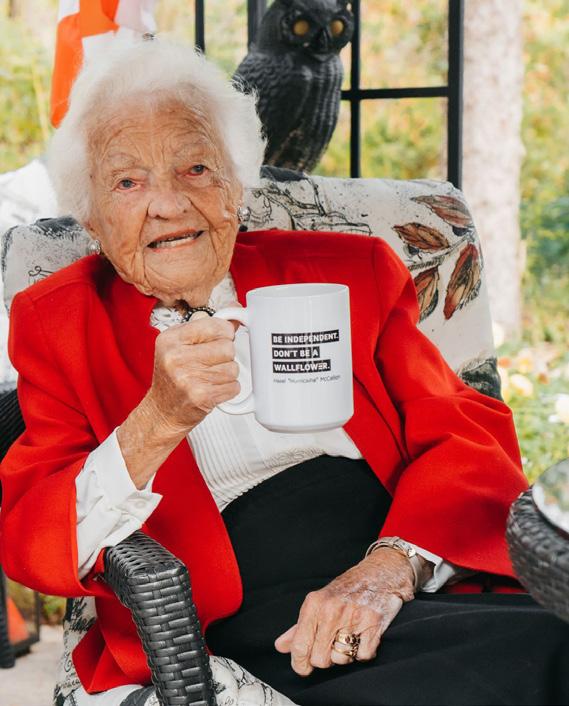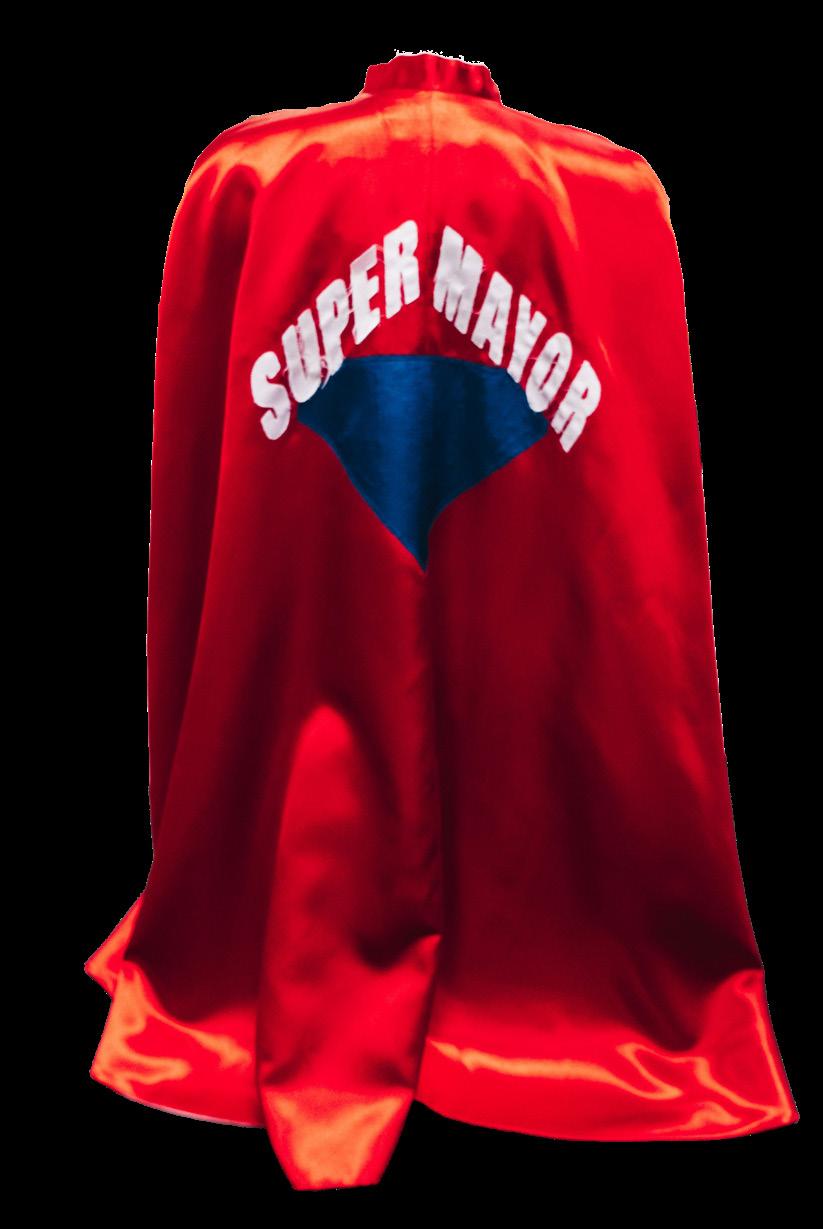
10 minute read
Tribute - Hazel (Hurricane) McCallion
Hazel (Hurricane) McCallion (February 14, 1921 - January 9, 2023) - Canadian icon, former Mayor of Mississauga for 36 years, the city's longest-serving mayor in the city's history.
A LIFETIME OF ACHIEVEMENT – Public figure, business woman, politician, philanthropist, athlete, wife, grandmother, advisor and mentor to many.
2021 Women of Inspiration™ Award Recipient | Women of Inspiration™ Women Driving Change Book
What inspired you to get involved with politics? I retired after 20 some years in the private sector. I was office manager of a large engineering contracting company. I got involved in Streetsville. My husband had a printing plant in Streetsville and when I retired, I got involved. I became president in Streetsville, in the district Chamber of Commerce and then I was asked to join the Street’s home planning board of the town of Streetsville. Later, I was encouraged to run as mayor or run for council.
The first time I ran for council, I didn’t win. The second time I ran in 1970, I won. I was Mayor of Streetsville from 1970 to 1974 and then the province brought along a regional government and put Streets, the whole Port Credit and the autonomous Mississauga together to form the city. I ran as counselor, representing Streetsville on the Mississauga council. Then in 1978, I ran as mayor of Mississauga and retired in 2014. I was Mississauga’s mayor for 46 years.
Tell us about your significant career milestones. In the fall of 1979, we had a major derailment in Mississauga during which we evacuated 250,000 people from our city. So, within a very short time of being Mayor, I was faced with my first major challenge. Together with a team of very good people including myself, city management personnel and provincial resources, we turned the Mississauga derailment crisis into a miracle. The miracle? There were no fatalities.
Tell us about how you and your team navigated through this disaster and put Mississauga on the map. There’s always an opportunity that comes with a challenge. Prior to the derailment, there were no regulations controlling the transportation of dangerous goods. And as a result of the Mississauga train derailment, Canada is safer today because there are regulations now that control the transportation of dangerous goods by truck, by air, by sea, and by every mode of transportation available.
We are experiencing an unprecedented time in our history with the global pandemic. What words of advice would you give leaders? The pandemic has clearly indicated to the government that everyone from families to community organizations cannot operate the way they once did. This is a major challenge. We must recognize it and take action to look at what improvements we can make socially and in the management of government funding.
And that’s the message that the pandemic has given the world. We have to look at how we have operated in the past and where it is not acceptable, we have to change. We have to look at how we can do a better job—how we can be more efficient, how we can do more and be less costly. We have to look at how we can help more people because there’s still a lot of poverty in the world.
What is your involvement in the community since your retirement? I’m on the airport board. I’m on the green saver board. I’m on the connect all board. I’m chief guardian of the hospitals in Mississauga. I am active— very, very active. I can’t sit around and not be doing something whether it is creating new ideas of how things can be operated or being very conscious of what’s happening in my local community, my province and my country. I say, “You have to be interested.”

You have to be curious to know what’s going on and maybe have the opportunity—which I do have—to make a difference and offer suggestions. There are all kinds of opportunities to be active—all kinds of opportunities.
Jordan Stothers
What keeps you so motivated and driven. What is your secret? You have to be curious to know what’s going on and maybe have the opportunity—which I do have—to make a difference and offer suggestions. There are all kinds of opportunities to be active—all kinds of opportunities.

You have to be positive as a leader, and you have to recognize the contribution that people make.
When you were 12, what did you want to be when you grew up? I left the Gaspé coast where I was born in Port Aniel during the depression. My two sisters put me through school and my business course in Montreal. One of my sisters was a schoolteacher and one was a nurse.
I went to work and from there on I was determined to be independent. I believe that if you work hard, are committed to your work and have a vision to be a success in whatever you undertake to do, it will inspire you to give your very best and be conscious of money. My first job paid me $12 a week. I paid $8 for board. I spent $2 on transportation and I put $2 in the bank.
You learn to take care of yourself. Because I could not phone home to mom and dad to send me money in Montreal, I had to become independent. And that is what is lacking in youth today. Their commitment to independence and giving their very best to whatever they do seems to be falling short.
What are the leadership traits that you are most proud of? Never overlook anything. I never overlook errors but I also give praise to say what a great job they did. You have to be positive as a leader, and you have to recognize the contribution that people make. This can not be overlooked. If you do, they overlook you. If you want to get the production that you need, you have to recognize people and say, “You’re doing a good job. Keep it up.” I had to prove to a lot of people that I wanted to work for them and with them.
What are some of the barriers you have seen women face and overcome in your lifetime? One area is in the field of politics. It’s been difficult for a woman to become Prime Minister of Canada. Why, it’s been difficult for a woman to become premier of the provinces. Some have, but it’s still a long way from where it should be. We still have problems with women being accepted in boards. And then in the private sector there is a real push to have more women on boards of directors. Furthermore, women have not been recognized in the private sector as they should be. And they haven’t been recognized in politics the way they should be either. There’s great hope for the future, but we still have a long way to go. We need leaders to step up and take on that role and know that it is their role to pass the torch. Do you agree?

Women have to become completely independent if they want to survive in a man’s world because it is a man’s world still. We’re making great progress because of the determination of women that became independent. Women are quite capable of performing any job that exists in the world.
What piece of wisdom would you share with the young women or the youth today? Well, young women have got to become independent. They have to realize that they have the potential to do anything they want to do if they really want to do it. They can, you know, and I’m so thrilled, as the first chancellor of Sheridan College, to see women graduating as technicians, as engineers and as planners. I see young women determined to do any job a man can do like operate a bulldozer.
Women have to become completely independent if they want to survive in a man’s world because it is a man’s world still. We’re making great progress because of the determination of women that became independent. Women are quite capable of performing any job that exists in the world.
How important is it to elevate the men that are champions for women in their networks, workplaces and communities? Men have supported me all the way in the business world. I was supported by the president of the company. He saw I had the desire to succeed. I did extra things that he recognized and acknowledged. It’s the same in the political world. I didn’t just go to the office in the morning as mayor. I worked both day and night as mayor up to 11 o’clock answering calls. If somebody wanted to talk to the mayor, they got to talk to me. I chose to give them my time.
As a female leader in politics who has broken through glass ceilings, how did you navigate through those barriers? Well, I started out in the private sector, moved to a high position and then I got involved in politics where you have to work harder still. A woman has to work harder to get to a top position. There’s no question about it but you have to show your independence and your confidence in yourself. You have to show that you want to accomplish certain things and that you’re determined to do it and not be, you know, a wallflower. There are far too many women that want to be treated as wallflowers. A woman has to work harder, both in politics and in the private sector, to be recognized and to gain success. So some of those barriers to success are simply getting there in the first place to have that role.
And COVID-19 has really shone a light on the role of women raising kids and all of the domestic home life duties…the bulk of which fall on the shoulders of women and then add caring for parents and extended family. It’s hard. There are sacrifices.

Don't be a wallflower! You have to show that you want to accomplish certain things and that you’re determined to do it and not be, you know, a wallflower.
Do you think women can have it all? Have success? Do you think there’s a balance for them or is there always some sacrifice involved? Oh, there is a lot of sacrifices involved. There is a lot to working outside the home; you have to plan every day. You don’t get up in the morning and ask yourself what you are going to do today. You plan before you go to bed at night. Planning is the key to life. It’s the key to building a community. It’s the key to building a company. It’s the key to building a family. It’s the key to life. Planning.
What are you most proud of in terms of what you have achieved in your life? I took a city from a rural area and built Mississauga with help—not me alone, with a team— into the sixth largest city in Canada. I look at the facilities, the arenas, the community centers, the libraries and all the facilities that have been built in the city for the people. It’s an honour to look after the people that you represent and look after a city that is not in big debt. Unlike a lot of cities, we were debt-free until the last two years of my term. We decided to convert our streetlights to energysaving versions. We didn’t have it in our budget. The money we borrowed to do it will be repaid to us in hydro savings within 10 years. I am proud to say I left the city in a good financial position and not too many cities in Canada can boast that. ecoleholtcouture.com
Planning is the key to life. It’s the key to building a community. It’s the key to building a company. It’s the key to building a family. It’s the key to life. Planning.
I used to say to my people of Mississauga, “I spend your money like I spend my own— which is seldom.” You have got to give service for the money you’ve spent. You might say Hazel McCallion did this, but I had a wonderful team of counselors that worked with me. I had a wonderful team of staff. If you have qualified, dedicated staff, you can accomplish a lot.

Planning is the key to life. It’s the key to building a community. It’s the key to building a company. It’s the key to building a family. It’s the key to life. Planning!










